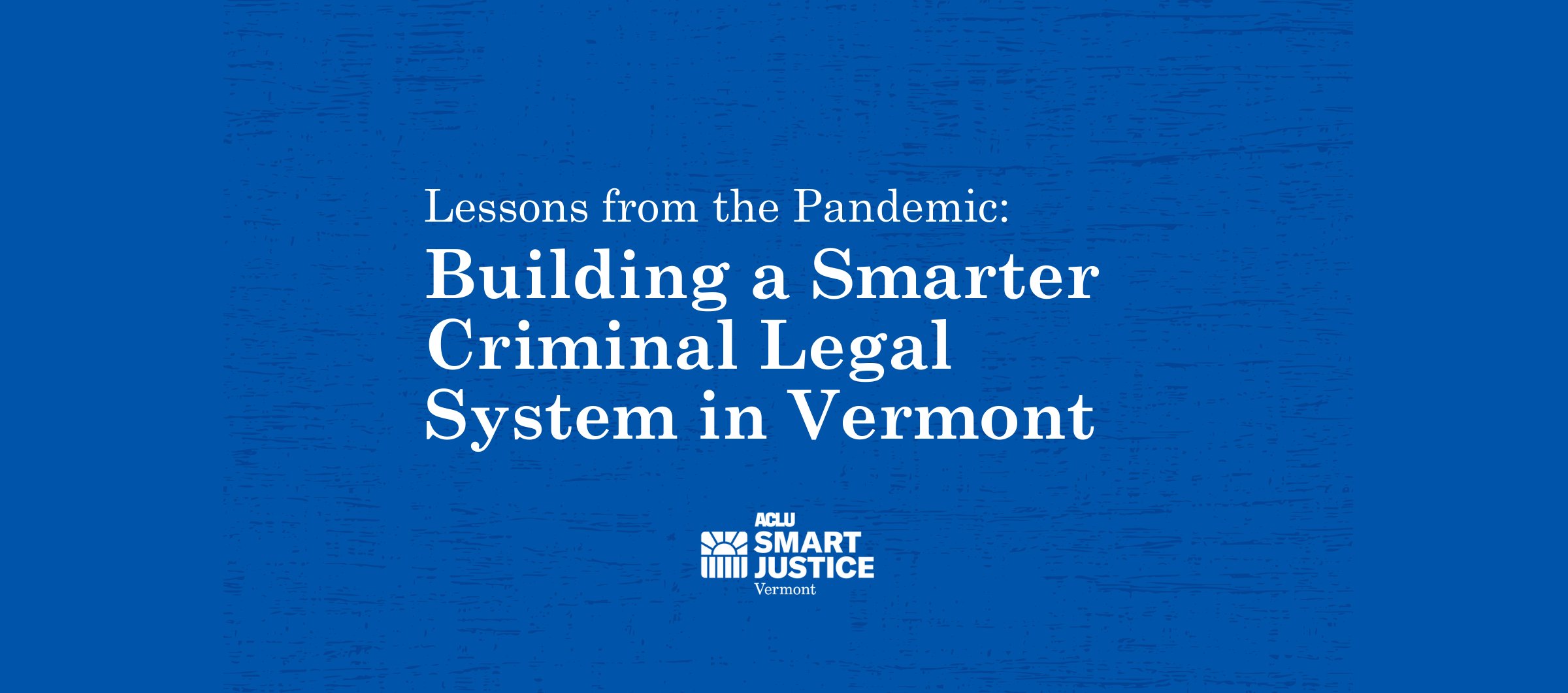When the COVID-19 pandemic hit Vermont in March of 2020, it required all of us to reexamine what we considered business as usual. This was especially true in Vermont’s criminal legal system. Ever since we launched our Smart Justice Campaign in 2018, we have urged Vermont to cut its prison population by at least half. The pandemic showed us that our goal is both realistic and well within reach.
Shortly after the governor declared a state of emergency in March 2020, Vermont incarcerated 1,656 people. By April 22, 2021 that number was reduced to 1,222 -- a drop of 27% from the start of the pandemic and a 45% reduction from our peak of approximately 2,200 people in 2008. This was achieved by implementing policies that centered the humanity of the people involved in the system and recognizing that we should focus on community-based solutions over incarceration.
Unfortunately, we are already starting to see the prison population increase – 100 more Vermonters are incarcerated today than just six months ago. After all the progress we have made to create a smarter criminal legal system we need to ensure that we don’t go backwards. How can we do that? The numbers offer some answers.
Reduce police interactions
Creating a smarter criminal legal system starts with reducing the footprint of law enforcement. Fewer interactions with law enforcement means fewer people that get unnecessarily caught up in the machinery of the criminal legal system.
After years of over policing in Vermont, we saw the numbers take a turn in the right direction after the start of the pandemic. From 2015-2019 police stopped motorists at v. While we don’t have full statewide data on police stops for 2020, data from the Vermont State Police shows that their traffic stops dropped 53% from 2019 to 2020. Further, the total number Vermont State Police Interactions dropped from 115,474 in 2019 to 78,725 in 2020, a reduction of 32%. These reductions paired with lower crime rates show us that we can safely reduce the footprint of law enforcement and keep more people out of the criminal legal system.
Reduce unnecessary charges and pretrial detention
Even one day in prison can have a devastating impact on a person’s life, potentially threatening their ability to keep their job or care for their children. It is essential that we do not incarcerate people who have not committed a crime unless they pose a clear threat to others.
Due to public health concerns, actors across the entire system, especially state’s attorneys, were deterred from bringing changes unless they were absolutely necessary. According to the Vermont Judiciary we saw a reduction in charges for all crimes from 2019 to 2020, including a 21% reduction in all misdemeanor charges and a 12% drop for all felony charges. This had a direct impact on the number of people being held pretrial without being convicted of a crime. From March 2020 to April 2021 the number of pretrial detainees dropped from 320 to 279, a 13% reduction.
Stop incarcerating people for technical violations of community supervision
Another piece of the puzzle is reducing the number of people returned to prison from community supervision. When people are on community supervision, such as probation, parole, and furlough, they can be reincarcerated for violating their conditions of release, even if these violations are not new crimes.
In 2019, we learned that violations of community supervision accounted for nearly 80% of new admissions to Vermont’s prisons. Though there is little data available on the subject, we have heard from both the Department of Corrections and those providing direct services to formerly incarcerated people that the number of people being sent to prison for violations of community supervision dropped significantly after March 2020. Based on the data and anecdotal evidence it appears to be clear that stopping the churn of people in an out of prison for violations of their community supervision was one of the leading drivers reducing our prison population.
We can’t go back to business as usual
Despite all these positive changes we have started to see the numbers take a turn in the wrong direction. From late April to September 21st 2021, we have seen a steady increase in the number of people in our prions. During this time, the prison population rose from 1222 to 1324, with people being held pretrial without a conviction accounting for more than 60% of the increase. This means that we are now holding more Vermonters pre-trial than before the start of the pandemic.
The pandemic is not over, but Vermont is already learning important lessons. When it comes to our criminal legal system, we’ve seen that we can create and strengthen systems of support that actually improve lives and make our communities stronger, achieving better outcomes and saving millions of taxpayer dollars in the process. Vermont did commendable work to cut our prison population by 45%, now is the time to learn the lessons of those efforts, not to reject them for a return to business as usual. Please take a few minutes to sign our Smart Justice Petition to tell decision makers that the time is now to create a smarter criminal legal system that is fair equitable and rooted in community-based solutions.

